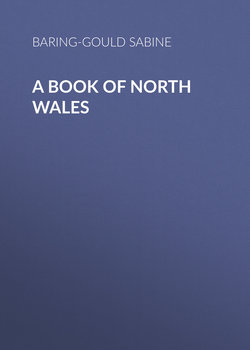A Book of North Wales

Реклама. ООО «ЛитРес», ИНН: 7719571260.
Оглавление
Baring-Gould Sabine. A Book of North Wales
PREFACE
CHAPTER I. THE WELSH PEOPLE
CHAPTER II. THE ENGLISH CONQUEST
CHAPTER III. ANGLESEY
CHAPTER IV. HOLYHEAD
CHAPTER V. BANGOR AND CARNARVON
CHAPTER VI. SNOWDON
CHAPTER VII. LLEYN
CHAPTER VIII. CONWAY
CHAPTER IX. S. ASAPH
CHAPTER X. DENBIGH
CHAPTER XI. LLANGOLLEN
CHAPTER XII. DOLGELLEY
CHAPTER XIII. HARLECH
CHAPTER XIV. WELSHPOOL
CHAPTER XV. NEWTOWN
CHAPTER XVI. MACHYNLLETH
Отрывок из книги
IT cannot be said that the Welsh have any very marked external characteristics to distinguish them from the English. But there is certainly among them a greater prevalence of dark hair and eyes, and they are smaller in build. This is due to the Iberian blood flowing in the stock which occupied the mountain land from a time before history began, at least in these isles. It is a stock so enduring, that although successive waves of conquest and migration have passed over the land, and there has been an immense infiltration of foreign blood, yet it asserts itself as one of predominant and indestructible vitality.
Moreover, although the language is Celtic, that is to say, the vocabulary is so, yet the grammar reveals the fact that it is an acquired tongue. It is a comparatively easy matter for a subjugated people to adopt the language of its masters, so far as to accept the words they employ, but it is another matter altogether to acquire their construction of sentences. The primeval population belonged to what is called the Hamitic stock, represented by ancient Egyptian and modern Berber. This people at a vastly remote period spread over all Western Europe, and it forms the subsoil of the French nation at the present day.
.....
Not till 1490 did peace and unity reign in Brittany, just five years after Henry Tudor became King of England, and put a stop to the strife in Wales. The late Mr. Green, in his The Making of England, laid stress on the important part that the Latin Church played in promoting the unity of the English race. But neither in France nor in Germany, there least of all, did it serve this end, and it was probably less the work of the Church that England became one than the peculiar genius of the Anglo-Saxon race. For a while we see it divided into three great forces – the Northumbrian, the Mercian, and the West Saxon – contending for the mastery, but each actuated by the dominating belief that so only could England thrive and shake off her enemies.
Mr. Green perhaps overrates the Anglo-Saxon, and thinks that the Britton disappeared from the soil before him as he advanced. At first, indeed, those who landed from their German keels proceeded to ruthless extermination. But as they advanced they ceased to do so; they were not themselves inclined to till the soil, they were content to spare their captives on condition that they became their slaves, and they certainly kept the women for themselves. Gildas, a contemporary, says that “some, being taken in the mountains, were murdered in great numbers; others, constrained by famine, yielded themselves up to be enthralled by their foes; others, again, escaped beyond the seas.”
.....